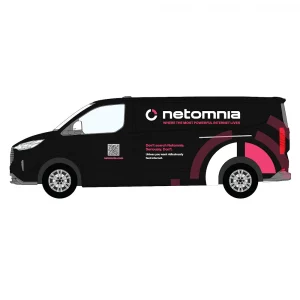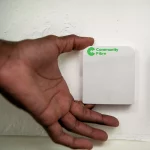Sponsored Links
BBC Blogs about 100Mbps Broadband at Wembley
Posted: 11th Feb, 2009 By: MarkJ
The BBC's technology correspondent, Rory Cellan-Jones (blog), has written about an interesting new housing development in Wembley (North London), which claims to include the promise of 'up to' 100Mbps broadband speeds using fibre optic infrastructure.
Cellan-Jones notes that residents have access to phone, broadband and IPTV (Internet TV) over the network, though nobody is actually being offered a specific 100Mbps subscription:
The blog reports that when the BOOST button is pressed a file was successfully downloaded at 78Mbps and as much as 50Mbps upstream. However not all services can cope, with Apple's iTunes prompting that a 1GB movie download would have taken 20mins (it should be a lot quicker with the speeds stated above).
It's certainly worth remembering that while a connection can be very fast, many other online services from websites to file transfer servers will often still be far slower. For example, many web servers limit the maximum speed at which you can download from any single connection, thus helping to balance network load.
Cellan-Jones notes that residents have access to phone, broadband and IPTV (Internet TV) over the network, though nobody is actually being offered a specific 100Mbps subscription:
Instead residents pay for an 8, 16 or 32Mbps service - but then can press a button marked "boost" to get their speed up to 100Mbps. That costs them £1 for 30 minutes. It seems the developers aren't convinced there is yet a real demand for 100Mps. They have "future-proofed" the homes, but if you want to spend a lot of time in the internet fast lane the bills will mount up.
What the developers Quintain tell me is that for plenty of residents 32Mbps at around £30 a month is more than enough. For some of the students who live here, that means they can also get by without a television, using the BBC iPlayer and other online services for all their viewing needs. I didn't inquire too closely whether they had got themselves a television licence.
What the developers Quintain tell me is that for plenty of residents 32Mbps at around £30 a month is more than enough. For some of the students who live here, that means they can also get by without a television, using the BBC iPlayer and other online services for all their viewing needs. I didn't inquire too closely whether they had got themselves a television licence.
The blog reports that when the BOOST button is pressed a file was successfully downloaded at 78Mbps and as much as 50Mbps upstream. However not all services can cope, with Apple's iTunes prompting that a 1GB movie download would have taken 20mins (it should be a lot quicker with the speeds stated above).
It's certainly worth remembering that while a connection can be very fast, many other online services from websites to file transfer servers will often still be far slower. For example, many web servers limit the maximum speed at which you can download from any single connection, thus helping to balance network load.
Search ISP News
Search ISP Listings
Search ISP Reviews
Latest UK ISP News








Cheap BIG ISPs for 100Mbps+
150,000+ Customers | View More ISPs
Cheapest ISPs for 100Mbps+
Modest Availability | View More ISPs
Latest UK ISP News
Helpful ISP Guides and Tips
Sponsored Links
The Top 15 Category Tags
- FTTP (6722)
- BT (3863)
- Politics (3036)
- Business (2736)
- Openreach (2629)
- Building Digital UK (2488)
- Mobile Broadband (2434)
- FTTC (2132)
- Statistics (2102)
- 4G (2062)
- Virgin Media (1997)
- Ofcom Regulation (1761)
- 5G (1692)
- Fibre Optic (1587)
- Wireless Internet (1581)
Sponsored
Copyright © 1999 to Present - ISPreview.co.uk - All Rights Reserved - Terms , Privacy and Cookie Policy , Links , Website Rules






























